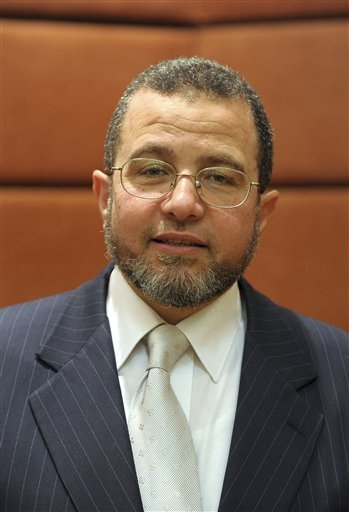
CAIRO (AP) — An alliance of pro-democracy advocates on Saturday criticized Egypt's new Islamist president for unilaterally choosing a prime minister with no track record, while leading without transparency and alienating political groups with liberal leanings.
The National Front alliance — an umbrella group of democracy advocates, secularists and moderate Islamists behind the uprising that drove longtime authoritarian ruler Hosni Mubarak from power last year — said Mohammed Morsi has reneged on campaign promises to form a national unity government.
On Tuesday, Morsi surprised the country by choosing an unknown technocrat and former water minister, Hesham Kandil, as his prime minister. Many advocates see Kandil, a U.S.-educated engineer in his 40s, as a political lightweight.
The new government faces a mounting crisis amid alarming lawlessness, a flagging economy, and public frustration. Hospitals have come under attack by angry Egyptians, while demonstrators block roads in frustration over frequent power outages and a lack of running water. Labor strikes are widespread.
Morsi picked Kandil a month after assuming his post as Egypt's first elected civilian president. Observers say the delay reflected hesitation by Morsi and his group the Muslim Brotherhood to reach out to strong consensus figures.
In a news conference, the Front said Morsi's decision-making "lacks transparency and clarity," creating "a clouded political scene." They reminded the president of his debt to allies who supported him last month in the decisive round of voting, helping him beat old-guard rival Ahmed Shafiq.
In return for the support, Morsi, a former leader of the Muslim Brotherhood, had pledged inclusiveness. In a meeting with the Front last month, he said he would choose an independent, nationalist politician to be Egypt's prime minister.
"It was surprising that the person named ... didn't meet the criteria and this is the first indicator of the path we are taking," said Heba Raouf, a moderate Islamist political science professor and a member of the Front. She said talks over the new government were held "behind closed doors."
Kandil on Saturday said that he will announce members of his cabinet on Thursday, according to Egypt's state-run news agency. Daily papers carried speculation about the incoming members, who will hail from Morsi's Brotherhood, an ultraconservative Muslim Salafist bloc, and pools of technocrats with no clear political affiliation.
The liberal Wafd party, one of the oldest parties in Egypt and a one-time political ally to the Muslim Brotherhood, said in a statement that it will not join Morsi's new government. Several current ministers, including Wafd party Tourism Minister Mounir Fakhri Abdel-Nour, a Christian, have said they will not serve in the new cabinet if asked.
Morsi is also under heavy pressure from the powerful military council which took power after the ouster of Mubarak. Before naming him as a victor, the council dissolved the Muslim Brotherhood-led parliament, took over legislative authorities and trimmed Morsi's presidential powers.
The National Front said those moves created a "duplication of authority" in Egypt and called on Morsi to defy the military and fight for his powers.
Attempts to take on the generals have failed, however. Earlier this month, Morsi ordered the dissolved parliament to reconvene, but the move was struck down by the country's Constitutional Court, which said the parliament is unconstitutional because based on a flawed election.
The court is packed by Mubarak-era and anti-Islamist judges who are fervent opponents of adding more religion to public life, which they believe Brotherhood's and Morsi aim to do.
The conflict over the new cabinet is fast becoming the next contest between Morsi and the military. Political actors doubt the generals would allow Morsi and Kandil free reign in forming a government, especially when it comes to the so-called sovereignty portfolios that include the ministries of defense, interior, foreign affairs and justice.
National Front member Mohammed el-Said Idris urged Morsi to work with a broader coalition of political forces in order to stand up to the army, whose generals were appointed by Mubarak.
"We are in an era in which institutions filled with old regime appointees are the ones in power," he said. "The president should take the initiative and create a partnership... or else we will reach a deadlock."